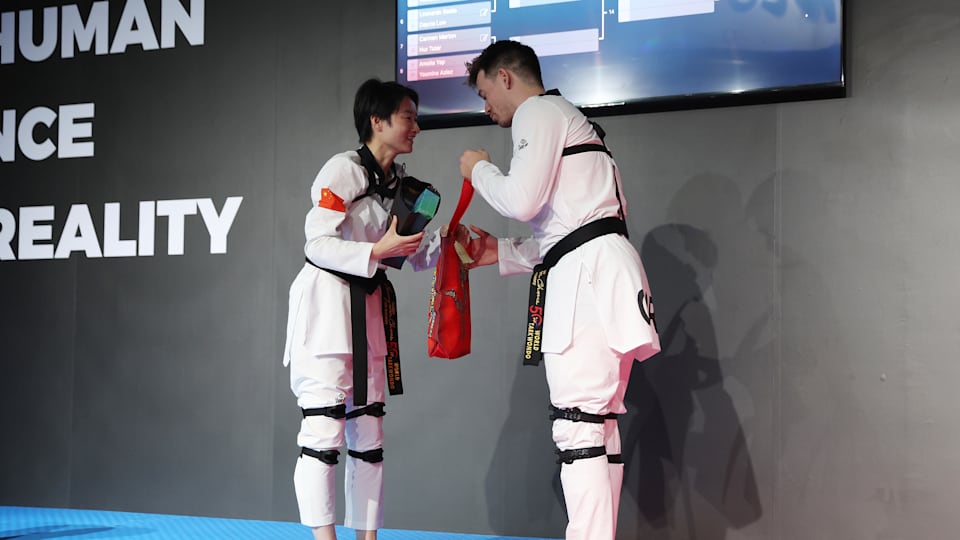Olympic champion Wu Jingyu looks to add Virtual Taekwondo Olympic Esports Series trophy to achievements
The two-time taekwondo Olympic gold medallist from People's Republic of China is one of eight Olympian taekwondo legends taking part in the inaugural Virtual Taekwondo event at the Olympic Esports Series, and one of just two to qualify for the final stage.

What do Wu Jingyu, Rohullah Nikpa, Leonardo Basile, Aaron Cook, Carmen Marton, Yasmina Aziez, Hwang Kyungseon, and Nur Tatar have in common?
For a start, they are all taekwondo Olympians, four of whom have won medals at the Olympic Games. And they're all also competing in the first Virtual Taekwondo competition of the Olympic Esports Series 2023 in Singapore.
Virtual Taekwondo is a virtual reality rendering of the traditional sport, which sees players – wearing taekwondo uniform as well as a headset and sensors on their hands and feet – play against one another in non-contact sparring.
"The advent of Virtual Taekwondo has allowed a lot of taekwondo athletes to come to competition, or come back to it," Wu explained to Olympics.com.
"That includes those like me who are retired athletes, or those who have just found taekwondo, coaches, those who've practised taekwondo but later gave up, all of us through this esport are able to play taekwondo again."
Wu Jingyu: How Virtual Taekwondo is different from real-world taekwondo
Wu won Olympic gold at Beijing 2008 and London 2012 for the People's Republic of China. She was one of two Olympic champions in the field, alongside the Republic of Korea's Hwang, while Afghanistan's Nikpai and Nur Tatar of Türkiye both also stood on Olympic podiums in their careers.
Having retired from competing after Tokyo 2020, her fourth Olympic Games, Wu – who has also dabbled in endurance running – said playing Virtual Taekwondo has allowed her to stay in touch with practising her sport.
"I have come across esports at the best time. Because when I play Virtual Taekwondo, I immerse myself fully into enjoying it. I don't have to worry about my age, or health, or injuries," as compared to when she competed in taekwondo at the highest level, Wu said.
While the sparring techniques are similar to real taekwondo, there is one thing that Wu can't quite get used to yet in Virtual Taekwondo.
"You don't feel the actual touch and feeling of the bodies. In Virtual Taekwondo, it's just the kicks; it actually feels a bit weird. But I think it's fun, it's different."
That has played into her consideration when she practises. Clearly still having the mindset of an Olympic champion and a winner, Wu said: "Recently when I've been training in Virtual Taekwondo, I've been thinking about how I can defeat my opponent. Because there is a strategy to Virtual Taekwondo.
"Compared with regular training, it's very different. In the virtual game, the speed and accuracy are important, but with the virtual reality headset on, you can't really see clearly, so you have to go off of feel."
But esports are not new to Wu, who revealed: "Gaming is not that strange to me because I played Street Fighter when I was young. So it's very familiar to me." Street Fighter is an exhibition event during Olympic Esports Week and will be held right before the taekwondo finals on Sunday 25 June.
Wu Jingyu (left) and Aaron Cook competed against each other in the first round of finals of the Olympic Esports Series in Virtual Taekwondo.
Virtual Taekwondo: Providing a level playing field
The competition at the finals of the Olympic Esports Series in Singapore is formed of two stages: an off-stage round of 16 and the remainder of the competition, held Sunday on the main stage.
A quirk of Virtual Taekwondo is that it levels the playing field no matter who is playing. The competition format in Singapore saw the eight legends being randomly drawn in a bracket alongside eight young local practitioners of the sport.
Wu explained: "The game […] allows normal people and Olympic champions, and even children, to play together. There are no ability differences, gender differences, or age differences."
And Wu – who spoke to Olympics.com ahead of the first round of competition – was on the mark with a prediction when asked about competing with local students.
"There's no guarantee we can beat them! Because they've been training and they're more used to the devices."
Wu and Türkiye's Nur Tatar were the only two legends to make it to Sunday's quarter-finals, having defeated fellow Olympians Aaron Cook (Great Britain and Moldova) and Carmen Marton (Australia) respectively. The other four legends, matched up against local players, all lost.
While there is no guarantee Wu will walk away as the inaugural Olympic Esports Series winner in Virtual Taekwondo, she did have words of advice for the local players who eliminated her Olympian compatriots.
"I hope you can keep their love for taekwondo going, and improve your lives through this sport."
The finals of the Virtual Taekwondo event on 25 June will be streamed globally on Olympics.com and Olympics social channels.
